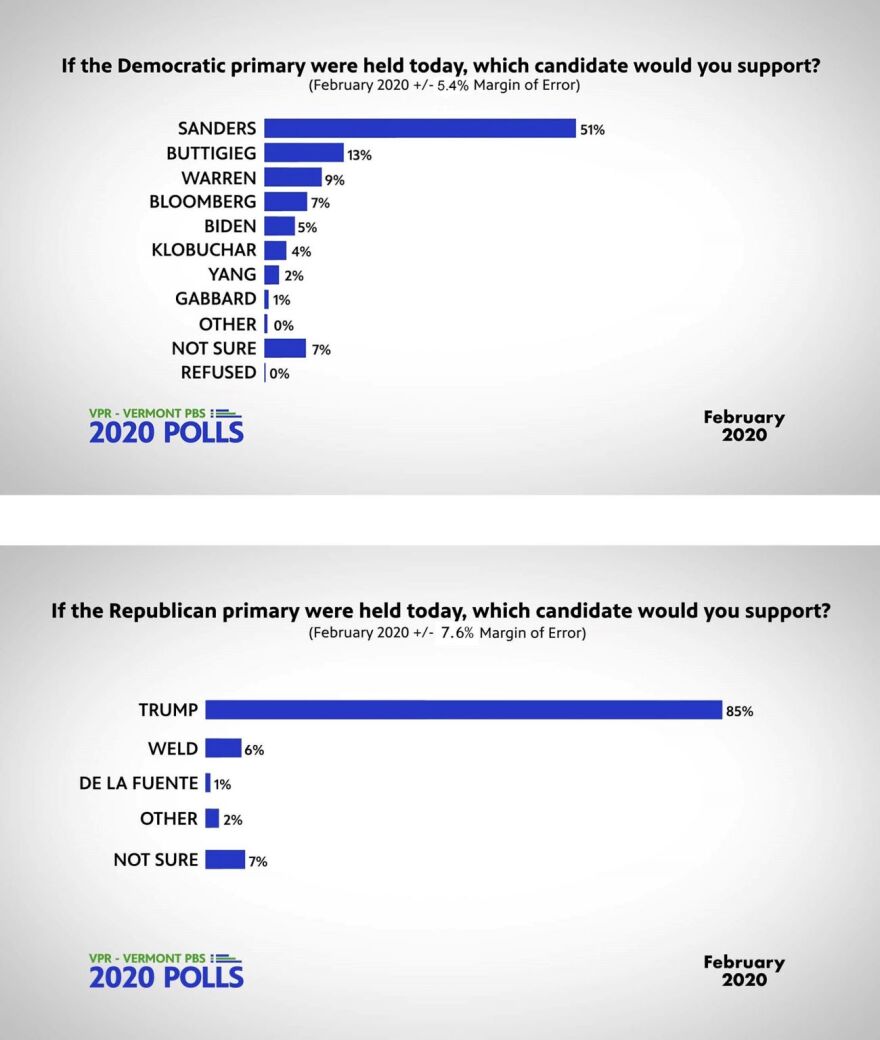More than halfway into his second term, Gov. Phil Scott enjoys widespread popularity and a huge advantage over his potential Democratic rivals. And Vermont Sen. Bernie Sanders appears poised to coast to victory in his home state's presidential primary.
These are two of the big takeaways from a new VPR - Vermont PBS poll released Tuesday.

Full VPR - Vermont PBS 2020 Poll Results
The phone poll of registered voters was conducted by Braun Research Inc., of Princeton, N.J. and overseen by Rich Clark of Castleton University. It took place from Feb. 4 to Feb. 10 — the New Hampshire presidential primary was Feb. 11.
Listen above to Morning Edition host Mitch Wertlieb discuss top-line poll results with VPR reporter Bob Kinzel and Castleton University's Rich Clark.
It has an overall margin of error of 4%, though several questions involving subsets of the overall poll sample have higher margins of error.
Presidential primary
Vermont is one of 14 states holding a presidential primary on Super Tuesday, March 3. According to the poll, the outcome does not appear in doubt: Sanders enjoys a big lead, with 51% of Democratic voters siding with him.
The next closest Democrat is former South Bend, Indiana, Mayor Pete Buttigieg at 13%, followed by Massachusetts Sen. Elizabeth Warren at 9%. The margin of error in the Democratic race is 5.4%.

President Donald Trump is well ahead in Vermont's Republican primary, 85% to 6% over former Massachusetts Gov. Bill Weld. The margin of error for the Republicans is 7.6%.
Phil Scott is very popular
Scott boasts a 57% approval rating in the poll, with only 26% unfavorable. And perhaps most notably, the Republican's popularity crosses party lines. His approval rating among Democrats is 58%, versus 54% with Republicans. (The margin of error for the Democrats is 5.4%. And for the Republicans it's 7.6%).
Scott's approval rating approaches those of Rep. Peter Welch (59%), Sanders (64%) and Sen. Patrick Leahy (64%).
Scott has not announced whether he will seek a third term in November. But at this early stage, he enjoys a commanding lead over two potential Democratic rivals.

He is besting Lt. Gov. David Zuckerman, 52% to 29%, with 15% undecided. Scott's advantage over the other declared Democrat in the race, former Education Secretary Rebecca Holcombe, is even larger. Scott is leading Holcombe 55% to 20%, with 22% undecided.
Minimum wage and paid family leave
Scott's popularity comes even though the poll finds widespread support for two Democratic priorities that he has vetoed: Raising the minimum wage and installing a paid family leave plan.
Of the respondents, 56% said they support a paid family leave plan, even if they would have to pay higher taxes to get it. Some 35% were opposed to the idea.

Earlier this month, Scott vetoed a mandatory paid family leave plan that would have been funded by a $29 million payroll tax. The House failed, by one vote, to override that veto. The Scott administration is pushing a voluntary paid family leave plan.
On minimum wage, 41% of respondents supported raising it from $10.96 an hour to $12.55, 33% would like to see it raised even higher, and 23% wanted to leave it where it is.

Scott vetoed the minimum wage hike to $12.55 last week. The Senate overrode his veto, and the House is expected to attempt an override soon.
Poll results, continued
VPR will offer reporting throughout the week on other poll topics, including climate change, Vermont's land development review law Act 250, and the state's lack of female representation in Congress.

From Feb. 4 to Feb. 10, the VPR - Vermont PBS 2020 Poll asked hundreds of Vermonters how they felt about various political candidates and issues. Explore the full results here.





